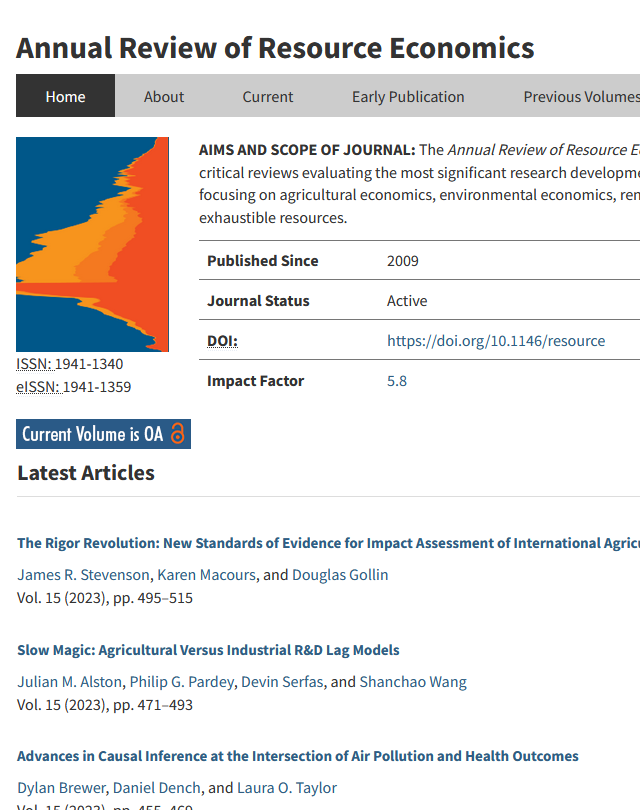健康食品能负担得起吗?用最低成本饮食衡量食物获取的过去、现在和未来
IF 8.4
2区 经济学
Q1 AGRICULTURAL ECONOMICS & POLICY
Annual Review of Resource Economics
Pub Date : 2025-07-22
DOI:10.1146/annurev-resource-121523-015144
引用次数: 0
摘要
本综述描述了使用当地可获得的成本最低的食品(与实际选择的数量相比)来衡量人口获得健康食品的情况的历史、当前做法和前景,以便区分健康饮食负担不起和营养不良的其他原因。几个世纪以来,零售价格、每日成本和相对于收入的可负担性一直被用来衡量食物获取情况,推动了早期贫困和维持生计的收入门槛的定义。在营养需要量被量化之后,基于食物成分的替代被引入,导致了线性规划和其他饮食建模技术的发展。本文描述了国际组织、政府机构和研究人员如何以及为什么采用现代饮食成本和可负担性指标来监测食品市场并指导干预措施,最后提出了限制获得健康饮食的其他因素的新研究领域,如烹饪成本和时间使用,以及导致低成本健康饮食被其他食物取代的因素。本文章由计算机程序翻译,如有差异,请以英文原文为准。
Are Healthy Foods Affordable? The Past, Present, and Future of Measuring Food Access Using Least-Cost Diets
This review describes the history, current practice, and prospects for measuring a population's access to foods for health using the lowest-cost locally available items, in contrast to quantities actually chosen, so as to distinguish between unaffordability of healthy diets and other causes of malnutrition. Retail prices, cost per day, and affordability relative to earnings have been used to measure food access for centuries, driving early definitions of poverty and income thresholds for subsistence. Substitution between items based on food composition was introduced soon after nutrient requirements were quantified, leading to the development of linear programming and other diet modeling techniques. This article describes how and why modern diet cost and affordability metrics have been adopted by international organizations, government agencies, and researchers to monitor food markets and guide intervention, concluding with new frontiers for research on other factors limiting access to healthy diets, such as cooking costs and time use, and factors that cause displacement of low-cost healthy diets by other foods.
求助全文
通过发布文献求助,成功后即可免费获取论文全文。
去求助
来源期刊

Annual Review of Resource Economics
AGRICULTURAL ECONOMICS & POLICY-
CiteScore
9.40
自引率
0.00%
发文量
34
期刊介绍:
The Annual Review of Resource Economics provides authoritative critical reviews evaluating the most significant research developments in resource economics, focusing on agricultural economics, environmental economics, renewable resources, and exhaustible resources.
 求助内容:
求助内容: 应助结果提醒方式:
应助结果提醒方式:


